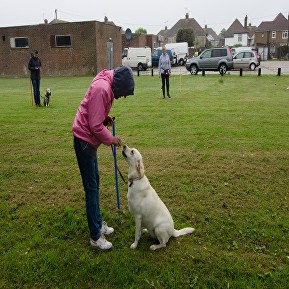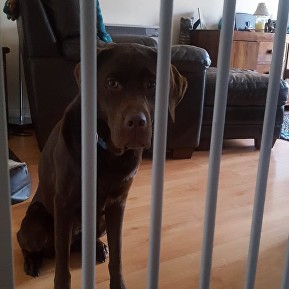

We all know that fewer letters are being sent through the post, but the rise in internet shopping means that more parcels and especially signed for parcels are being delivered, which requires the delivery person to knock at the door. This change in legislation should be a wake up call to all dog owners to ensure their dogs are under control when they open the door otherwise they risk committing a criminal offence.
It is not unusual for a dog to be reactive to any visitor to your door, so you need to decide now how you are going to manage that situation. The easiest thing to do is to shut your dog in another room or in the garden, provided of course the dog cannot access the front door from the garden.You can use a crate, if the dog is crate trained or a baby gate between rooms if closing the door between rooms is not an option.

You also need to consider how your dog greets people. What you view as a dog being friendly by jumping up at visitors may be seen as threatening behaviour by a stranger.
There is a slight grey area in these changes in that if the person attacked is a burglar or trespasser your dog may not be considered dangerously out of control if it is in a building that is your private dwelling at the time of the attack. However, this does not cover incidents in your back or front garden so while the law is yet to be tested, all dog owners should ensure that all areas of their gardens where their dogs could encounter unexpected visitors are secure.
If necessary it is also worth talking to your neighbours and asking them not to let their children climb your fences to retrieve balls etc to be on the safe side.
Since 6th April 2016, all dog owners in England, Scotland and Wale must have their dog microchipped and to register them with a government compliant microchip database.
After that date, all puppies must be microchipped and recorded on a microchip database by the time they are 8 weeks old.
Any changes to an owner’s contact details must be updated on their microchip database to ensure compliance with the law. If a dog owner subsequently moves, changes contact telephone number, etc then the dog is no longer considered microchipped under the new law and enforcement can be taken.
The council can impose on the spot fines if you do not clear up after your dog. This excludes registered blind dog owners.
I recommend you insure your dog too.
Every dog in public must wear a collar with the name and address of the owner inscribed on it and, although not a requirement, I would also recommend your telephone number and your vets number.
There are many different terms used to describe positive training techniques: positive reinforcement, reward-based, force-free etc.. What they all have in common is a shared belief that it is much safer, more effective, to teach our dogs using the concept that if you reward a behaviour you like, it is more likely that that behaviour will be repeated. If you ignore or redirect a behaviour you do not like, it is more likely that the behaviour will decrease. Combine this with the awareness that dogs are not wolves trying to dominate us, and therefore do not need to be controlled using dominance-based punishment techniques, and you have the recipe for our training beliefs
We believe that enhancing your relationship with your dog and having fun go hand in hand.Countryside Code
You do not have to put your dog on a lead on public paths, as long as it is under close control. But as a general rule, keep your dog on a lead if you cannot rely on its obedience. By law, farmers are entitled to destroy a dog that injures or worries their animals.